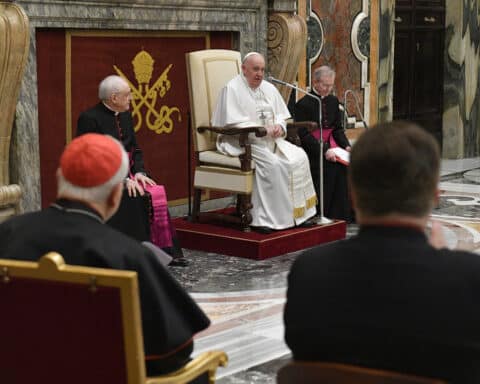
— Julie Robinson, via email
Answer: Paragraphs 75-100 of the Catechism of the Catholic Church speak of sacred Tradition as the common life, worship and teaching of the Catholic faith. But asking for a list of sacred Traditions is a bit like asking, “What is culture, and where can I find a list of it?” It is not that simple.
Sacred Tradition is the lived experience of the Church, much of which predates the writing and canonizing of the New Testament Scriptures. In fact, Scripture itself is the written aspect of sacred Tradition and is both contained and indicated by it, for it wasn’t until the fourth century that the list of the books that make up the Bible was agreed upon by the bishops and the pope.
Even the Protestants, who are usually dismissive of the idea of sacred Tradition, have to admit that many of their own practices are drawn from it. For example, there is no text in the Bible that officially and unequivocally declares that we are to worship on Sunday and therefore fulfill the Sabbath. The definitive move from Saturday to Sunday as the day to fulfill the commandment of keeping holy the Sabbath comes from sacred Tradition, from the practice of the early Church.
Other crucial terms such as “Trinity” are not in Scripture but come from sacred Tradition. While the teaching of the Trinity is certainly in Scripture, it took almost three centuries to hammer out all the details and develop terms such as “Trinity” (a word that speaks to the “three (tri) oneness (unity)” of God). I suppose the closest thing to a list might be found in Henrich Denzinger’s “Enchiridion Symbolorum.” A more accessible source, organized topically rather than chronologically, is Ludwig Ott’s “Fundamentals of Catholic Dogma.”
However, even these lengthy lists cannot fully capture sacred Tradition, any more than your photo albums can fully detail your life. Sacred Tradition speaks to more than doctrines. It speaks to the Church’s lived experience and consistent way of interpreting Scripture, and living out all the things Christ and the apostles left us, whether written or in the oral tradition.
Thus St. Paul says, “Therefore, brothers, stand firm and hold fast to the traditions that you were taught, either by an oral statement or by a letter of ours” (2 Thes 2:15). In other places, St. Paul speaks to the example he left them and that we should “take as your norm the sound words that you heard from me, in the faith and love that are in Christ Jesus” (2 Tim 1:13). Sacred Tradition points to the pattern of sound teaching and how the Church, especially in the earliest centuries, lived and experienced that.
Confession
Question: In confessing our sin, why can’t we go directly to God? Even priests have sins.
— Leo Leduc, via email
Answer: You can go directly to God and should repent of your sins every day unto him. However, Jesus himself set up confession in the Gospel of John when he breathed on the apostles and told them, “Whose sins you forgive are forgiven them, and whose sins you retain are retained” (Jn 20:23). Thus he expects them to use this power, and for others to come to them and their successors. That priests also sin is evident. Doctors also get sick, but we still go to them.
Msgr. Charles Pope is the pastor of Holy Comforter-St. Cyprian in Washington, D.C., and writes for the Archdiocese of Washington, D.C., blog at blog.adw.org. Send questions to msgrpope@osv.com.





